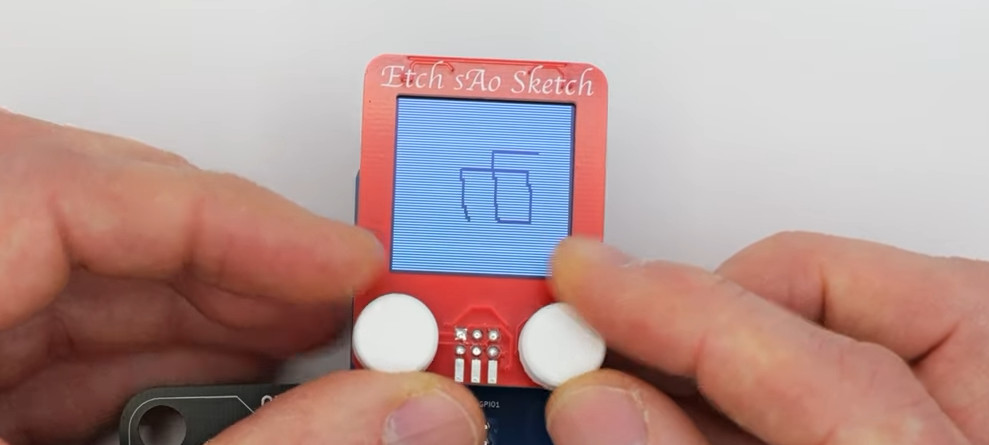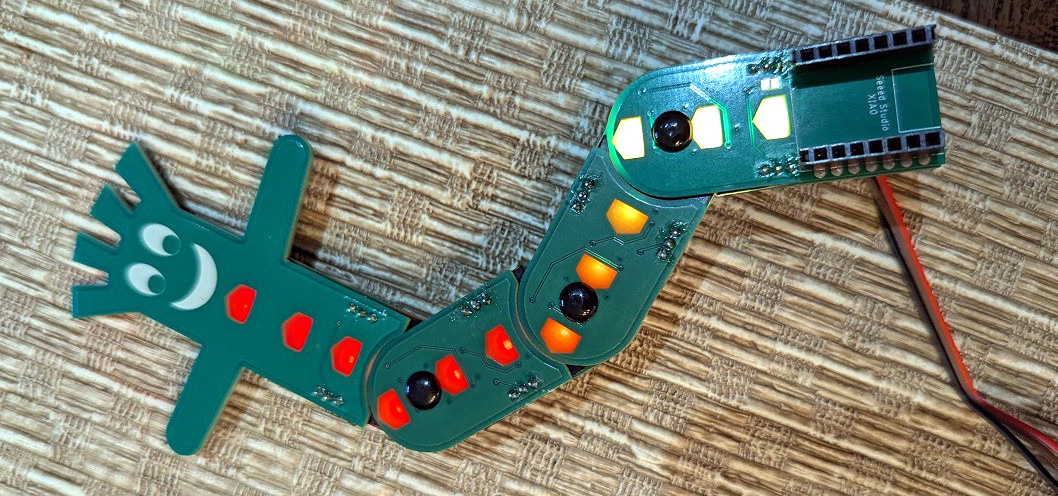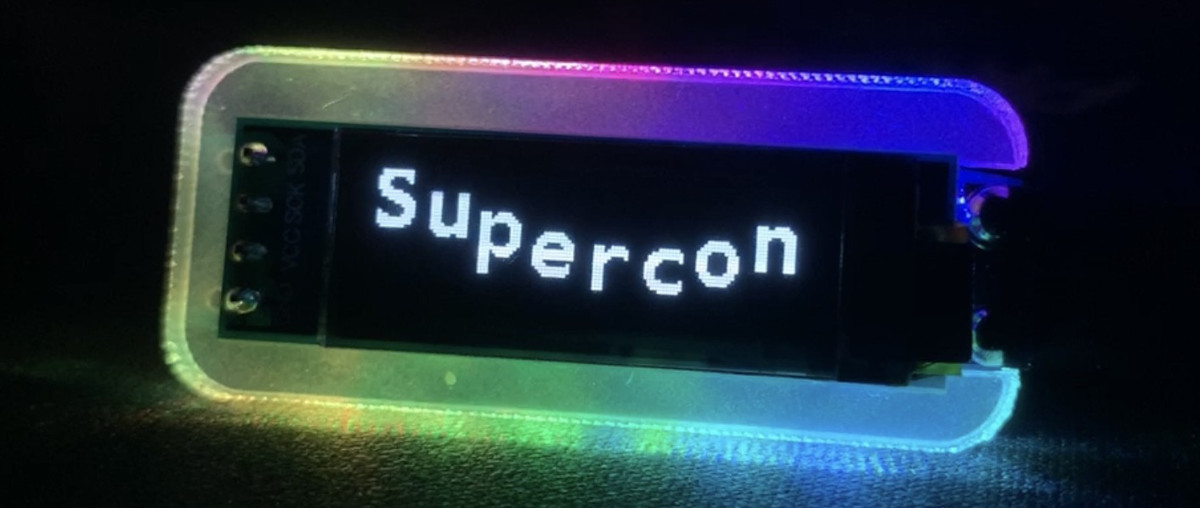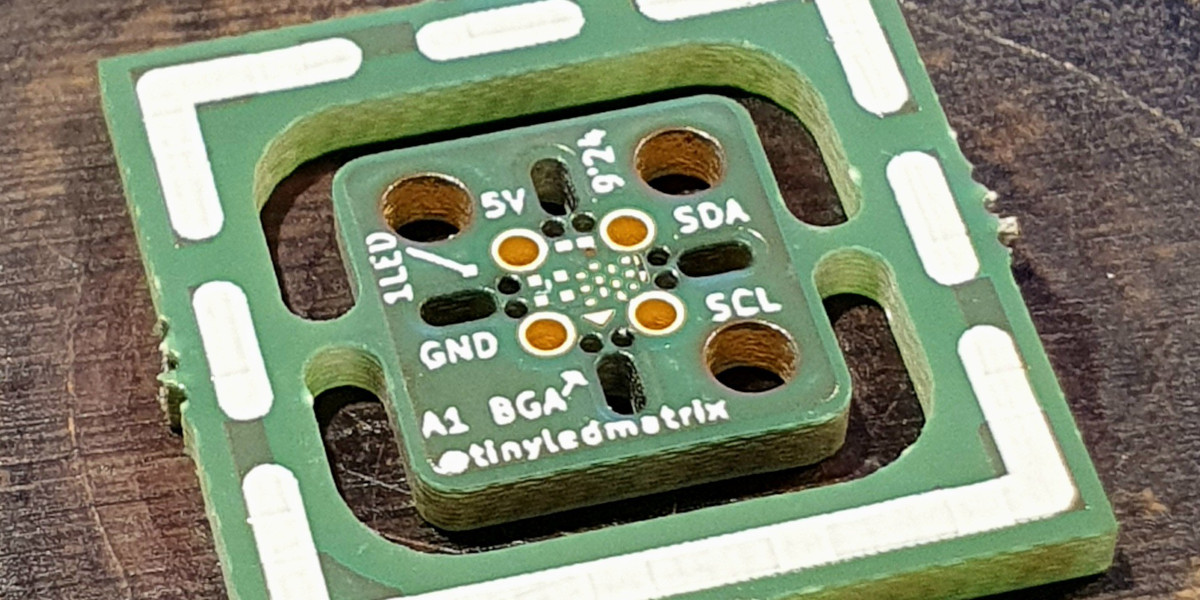Supercon 2024: Badge Add-On Winners

This year we challenged the Hackaday community to develop Shitty Simple Supercon Add-Ons (SAO) that did more than just blink a few LEDs. The SAO standard includes I2C data and a pair of GPIO pins, but historically, they’ve very rarely been used. We knew the talented folks in this community would be able to raise the bar, but as they have a tendency to do, they’ve exceeded all of our expectations.
As we announced live during the closing ceremony at the 2024 Hackaday Supercon, the following four SAOs will be put into production and distributed to all the attendees at Hackaday Europe in Spring of 2025.
Best Overall: SAO Multimeter
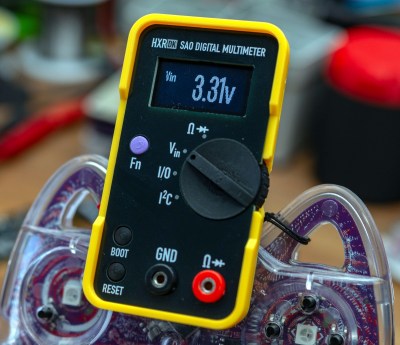 For the “Best Overall” category, we only intended to compare it with the other entries in the contest. But in the end, we think there’s a strong case to be made that [Thomas Flummer] has created the greatest SAO of all time. So far, anyway.
For the “Best Overall” category, we only intended to compare it with the other entries in the contest. But in the end, we think there’s a strong case to be made that [Thomas Flummer] has created the greatest SAO of all time. So far, anyway.
This add-on is a fully functional digital multimeter, with functions for measuring voltage, resistance, and continuity. The design is a pure work of art, with its structure combining stacked PCBs and 3D printed parts. There’s even tiny banana plugs to connect up properly scaled probes. Incredible.
In the documentation [Thomas] mentions there are additional functions he didn’t have time to include in the firmware, such as modes to analyze the I2C and GPIO signals being received. Now that it’s been selected for production, we’re hoping he’ll have the time to get the code finished up before its European debut.
Fun: Etch sAo Sketch
This SAO recreates the iconic art toy in a (hopefully) non-trademarked way, with a 1.5″ inch 128 x 128 grayscale OLED display and a pair of trimpots capped with 3D printed knobs. Drawing is fun enough, but the nostalgia really kicks in when you give it a good shake — the onboard LIS3DH 3-axis accelerometer picks up the motion and wipes the display just like the real thing.
Created by [Andy Geppert], this SAO isn’t just a pretty face. Flipping it over shows an exceptionally clever technique for connecting the display board to the main PCB. Tiny metal balls (or “alignment spheres” if you want to get fancy) mate up with the mounting holes on the OLED board and center it, and a touch of solder locks it all in place.
Fine Art: Bendy SAO
While this wacky, waving, inflatable, arm-flailing SAO might look like the sort of thing that would be outside of a used car dealership, but creator [debraansell] managed to shrink it down so the point that it’s reasonable to plug into your badge. More or less.
There are several fascinating tricks at work here, from lighting the PCB from the back using side-firing LEDs to the integrated slip rings. If this one didn’t look so good, it would have been a strong contender for the “Least Manufacturable” Honorable Mention.
Functional: Vectrex SAO
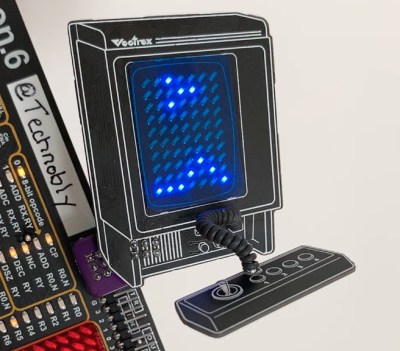 Creating a replica of the Vectrex at SAO scale would have been an impressive enough accomplishment, but [Brett Walach] took this one all the way and made it playable.
Creating a replica of the Vectrex at SAO scale would have been an impressive enough accomplishment, but [Brett Walach] took this one all the way and made it playable.
The display is a 7 x 10 Charlieplexed LED matrix, while the “joystick” is implemented with a 1-button capacitive touch sensor. A PIC16F886 microcontroller runs the simplified version of Scramble, and there’s even a speaker for era-appropriate audio.
But that’s not all! This SAO was also designed to be hacked — so not only is all the hardware and software open source, but there’re various jumpers to fiddle with various settings and an I2C control protocol that lets you command the action from the badge.
Honorable Mentions
As usual, this contest had several Honorable Mentions categories — while we would have loved to put all of these SAOs into production, there’s only so much we can do before now and Spring.
[Jeremy Geppert]’s SAO LoRa Walkie Talkie was a judge favorite, for its simple good looks and the extra functionality that it brings to the table. [Scorch Works]’s SAO Infinity Mirror was absolutely beautiful to see in person, and makes a fantastic display when many of them get together. And [MakeItHackin]’s Skull of Fate SAO not only looked super when its eyes scan the room, but it could read your future as well!
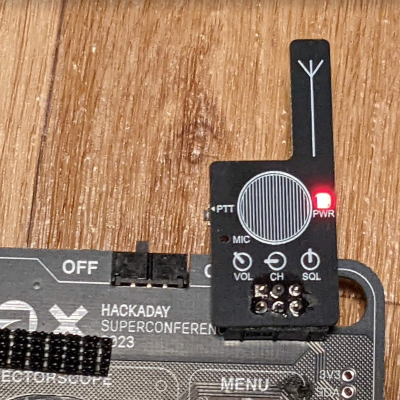
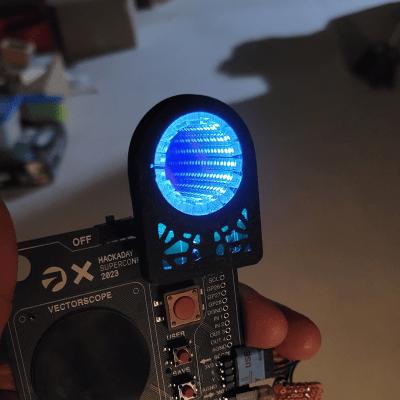

Best Communication:
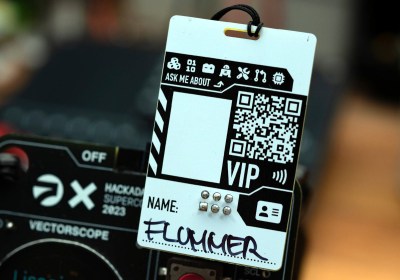 Using I2C to get SAOs to talk to the badge (or each other) was a big part of this contest, but we were also on the lookout for entries which helped facilitate badge-to-badge communications.
Using I2C to get SAOs to talk to the badge (or each other) was a big part of this contest, but we were also on the lookout for entries which helped facilitate badge-to-badge communications.
The Badge Tag NFC SAO from [Thomas Flummer] is a perfect example of both — it uses the NXP NTAG I2C Plus to provide 2K of read-write storage that can be accessed either internally through the I2C bus by the badge, or externally by an NFC device such as a smartphone. Modeled after a traditional conference name tag, this SAO was designed to make it easier for sharing your contact info with others during a busy con.
Infrared Communication SAO by [Alec Probst] brings infrared communications to the party, while looking like a classic TV remote. Though the original idea was to get this working in conjunction with the badge to act as a sort of TV-B-Gone, it ended up being used as part of a laser tag game during Supercon.
The GAT Nametag SC8 from [true] tackles communication on a more human level by providing a digital name tag for your badge. This compact board’s secret trick is the ability to make sure your name is legible no matter what its orientation thanks to a LIS2DW12 accelerometer that can detect the SAO’s orientation relative to the ground. RGB LEDs catch the viewer’s eye, but it’s the incredible firmware with seemingly endless options for text styling and tweaks that really set this build apart.
Light Show:
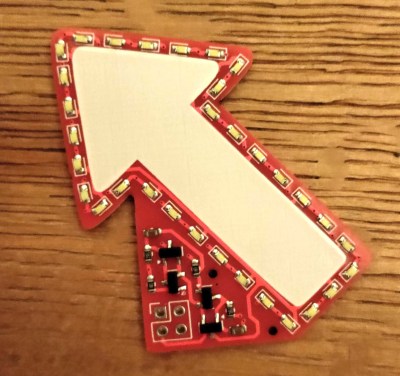 There’s little question that Featuring You! from [Nanik Adnani] is a perfect entry for this category. Nominally, it’s a little arrow you can write your name on and use a name tag. But power it up and you can dazzle anyone standing too close with its array of marching white LEDs. In a particularly nice touch, the circuit is implemented with only discreet components — no microcontroller.
There’s little question that Featuring You! from [Nanik Adnani] is a perfect entry for this category. Nominally, it’s a little arrow you can write your name on and use a name tag. But power it up and you can dazzle anyone standing too close with its array of marching white LEDs. In a particularly nice touch, the circuit is implemented with only discreet components — no microcontroller.
The reDOT_RGB from [Alex] is a tiny 5×7 RGB LED matrix with a minuscule ATtiny816 MCU around the back to control the show. At just 8 x 11 mm, it’s hard to overstate just how tiny this SAO is.
While on the subject of tiny boards, the
Persistence of Vision POV Display is another entry not much larger than the SAO connector itself. Using a row of five tiny white LEDs and a ADXL345 accelerometer, [Michael Yim] is able to write text in mid-air thanks to the gullibility of the human eye.
Least Manufacturable:
Simple Add-Ons are essentially an art form, so it’s not surprising to find that they don’t often lend themselves to mass production. Several of the entries this yeah would be a real challenge to make in large numbers, but the one that really keeps us up at night is the ultra tiny smart SAO from [Alex].
This board is designed to fit inside the space between four header pins. Thanks, but no thanks.
Raising the Bar
Our hope this year was to elevate the Simple Add-On from a decorative piece of flair to something functional, and potentially, even useful. The results were incredible, and while we can only pick four winners this time around, every entry helped push the state-of-the-art forward in its own way. It’s hard to imagine how the SAO envelope can be pushed any further, but we can’t wait to find out.
